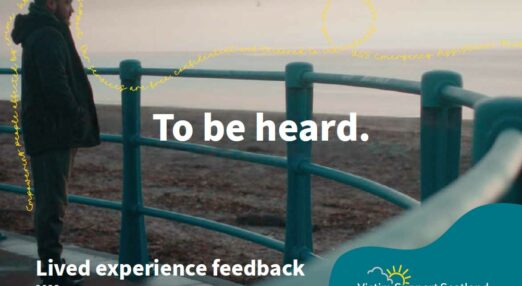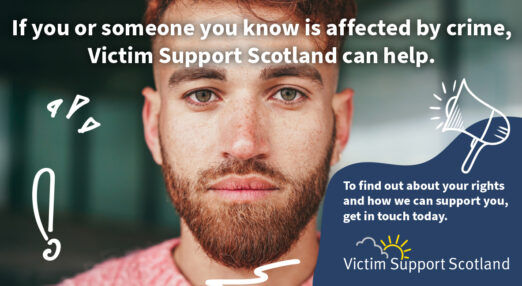Future of criminal justice system hangs in balance due to Covid-19
Chloë Minish, our Policy and Research Officer, writes about the steps the criminal justice system can take to get back up and running as COVID-19 lockdown measures ease and examines some of the changes desperately needed to better support people affected by crime in the long term.
The announcement from the First Minister that Scotland will be moving into Phase 3 of lockdown is a welcome one, especially for those who have gone months without seeing their friends and families in an effort to stem the surge of coronavirus. But for people affected by crime, the easing of lockdown measures will do little to reassure them.
Chief Executive of the Scottish Courts and Tribunals Service (SCTS), Eric McQueen told the Scottish Parliament Justice Committee in May that Scottish courts would take at least three years to clear the backlog of solemn cases alone.

Meanwhile, victims and witnesses are left with delays, a lack of information about their trials and uncertainty about when, if ever, their case will go to court.
The devastating impact of this on mental health and wellbeing cannot be stressed enough. After only a few weeks of lockdown, Victim Support Scotland recorded a staggering increase in the number of victims contacting our services reporting that they were experiencing suicidal thoughts and mental health issues.
Coronavirus has caused a crisis in our courts and the justice system is struggling to cope. Now more than ever, we must listen to people affected by crime to prevent the situation getting any worse for victims.
The Victims Taskforce was established in 2018 to improve support, advice and information for victims of crime. It is made up of people with direct experience of crime, victim support organisations, criminal justice agencies and the Scottish Government. Its aim is to ensure victims’ voices are heard and streamline their journey through the justice system. Their voices are vital as we look to how to recover.
The legal profession is notorious for its use of archaic and unintelligible terminology. Throw in almost identical acronyms – SPS, SCTS, COPFS, VNS, VIA – and the justice system feels impossible to navigate, let alone when someone is in the midst of a traumatic experience.
Providing victims and witnesses with resources and information that is clear and easy to understand is vital. When redesigning resources for our new website last year, Victim Support Scotland took on board feedback from our service users to provide information in bitesize chunks through our support guides, rather than in a single document that felt overwhelming. We have also worked with the Scottish Children’s Reporter Administrator (SCRA) to produce information aimed at children and young people whose case will be going through the Children’s Hearings system.
As part of the Coronavirus (Scotland) Act, emergency measures were announced by the Scottish Government to permit the early release of prisoners to allow for single-cell occupancy and cope with absences of prison staff. This included providing updates to victims of eligible prisoners through the Victim Notification Scheme.
While this was a welcome move, it ignored key concerns that victims’ organisations have held around the Victim Notification Scheme since it was introduced in 2016: victims do not have enough of a choice in how criminal justice agencies will communicate with them and this can mean they are re-traumatised. In addition, while the Victim Notification Scheme may entitle some victims to information, it does not guarantee support will be provided. Support is crucial given the nature of the information that is provided regarding their perpetrator.
The justice system has been slow to embrace technology. The vast majority of communication is made via letters sent to the last known address. Making the option to be updated via email and text alert services, rather than placing the onus on victims to keep going back to agencies to update their details would be an easy and cost-effective improvement to implement. This won’t be suitable for all victims, but it will be welcome for many.
Judges have a significant role to play in ensuring the justice system fulfils its obligations to victims. Ensuring the practice of sentence discounting for entering a guilty plea is clearly explained to victims and their families, as well as providing a clear explanation of how a decision on the sentence has been reached would provide a sense of understanding that the victim’s experience has been fully considered.
High profile serious sexual assault and rape trials have raised serious concerns in how the courts and judges treat victims and considers their experiences. The number of survivors who tell us that “the trial was worse than the experience of being raped itself” should send alarm bells ringing across the criminal justice system.
Providing specialist training for jurors to allow them to examine their own unconscious biases and address harmful rape myths would be a welcome commitment.
As we move away from outdated approaches that focus on punishment and towards rehabilitation, the need to provide properly funded community justice resources that work alongside more traditional elements of the justice system to support victims cannot be side-lined any longer.
Investment in services for children and young people, increasing the resources available for social workers and addiction services, and changing how mental health services are provided to allow for earlier intervention rather than management once things have reached a crisis point are vital to this transition. This would help to support people affected by crime and begin to address the types of crime that have flourished as a result of austerity measures. The Scottish Violence Reduction Unit has shown the effectiveness that taking a multi-agency approach which incorporates policing has the potential to make.
The justice system may not be the most obvious casualty in a pandemic to some. But by listening to the needs of people affected by crime and being open to evolving to meet the challenges of life in post-pandemic Scotland, the justice system can recover without sacrificing the needs to support victims and witnesses in the process.
Latest news and blogs
-

Victims’ charity seeks support to uphold victims’ rights
Victim Support Scotland, Scotland’s leading national charity for victims, is urging MSPs to consider victim support and information needs in the Children (Care and Justice) (Scotland) Bill as the debate of Stage 3 of the Bill approaches on 24 April.
Read more
-

Join Victim Support Scotland as a charity Trustee
Are you an exceptional leader, ambitious for change to improve victims’ and witnesses’ experiences of the criminal justice system? Leading charity VSS is looking for high calibre and committed professionals to join our Board of Trustees.
Read more
-

The importance of feedback
We always seek to hear from individuals affected by crime about their experiences with our services. This is crucial to ongoing learning and improvement within our work and in informing others about how our support can make a difference. We particularly encourage those who have experienced harm caused by children and young people under 18 to share their views.
Read more
-

Minister goes to court to learn about services for victims and witnesses
As part of Victims’ Awareness Week, Minister for Victims and Community Safety Siobhian Brown visited Edinburgh Sheriff Court for a familiarisation visit.
Read more
-

Bex’s story
Read more
-

Campaign launches to support more victims of crime – press release
Read more
-

Student Volunteering Week – Priya’s story
Read more
-

Student Volunteering Week – Anna’s story
Read more
-

Victim support organisations sign open letter calling for anonymity for children who die as a result of crime
Read more
-

Over 60 families bereaved by crime in Scotland sign open letter calling for change in law to protect child victims of murder
Read more
-

Victims and Witnesses – Joint Protocol
Read more
-
2023 – look back
Read more











